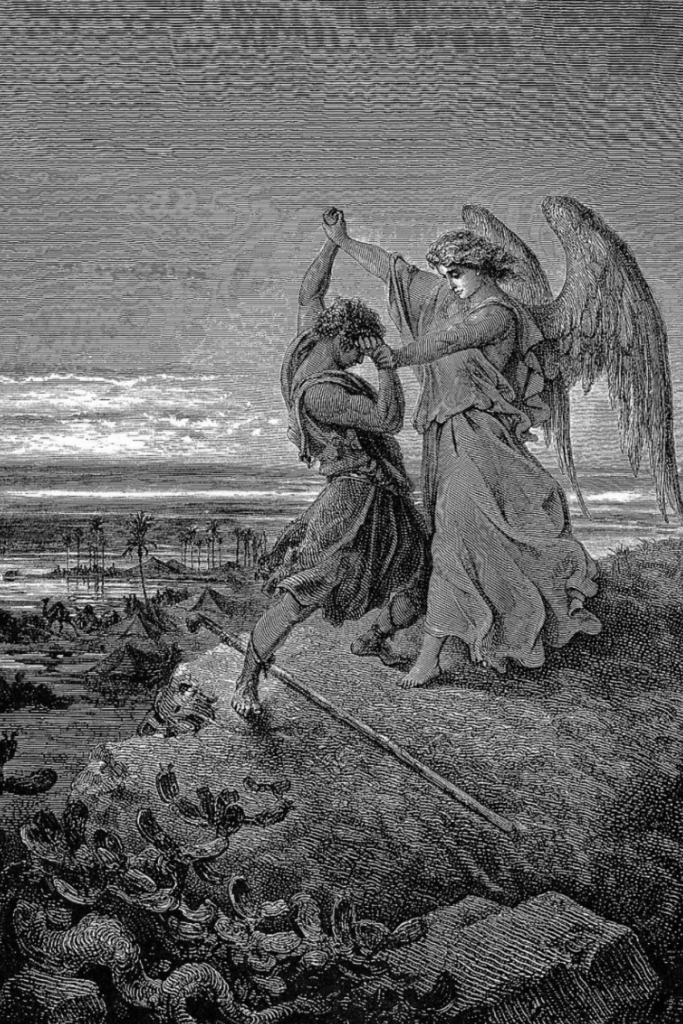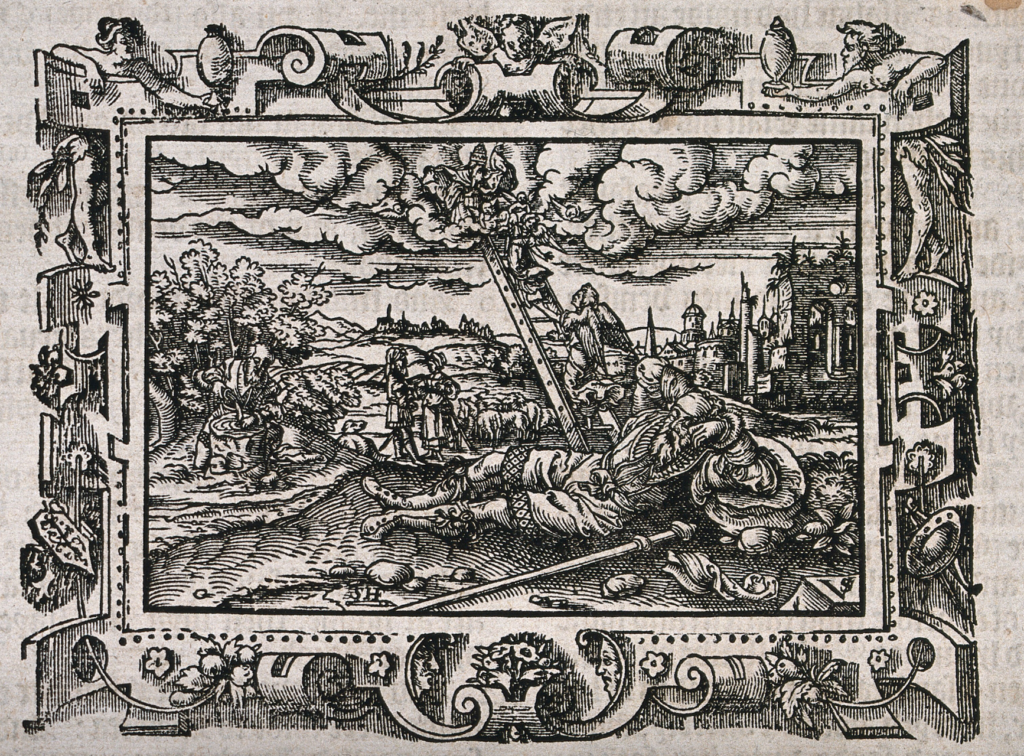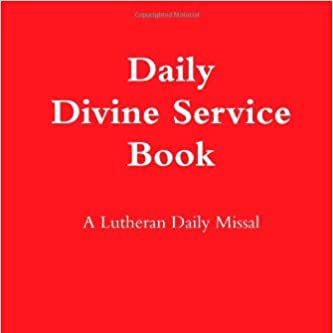Ladder to Heaven

The Old Testament patriarch celebrated on February 5th, Jacob (Israel), is a man tied to many of the other saints whom the Lutheran Church commemorates and about whom we’ve previously written here at All the Household. The grandson of Abraham and Sarah, son of Isaac and Rebekah, and father to Joseph, Jacob was well connected to these other prominent characters in the greatest story ever told and the third in line to God’s ancient promise that Abraham’s offspring would be a blessing to all the nations of the earth.
As Scripture tells us in his parents’ story, Jacob is the younger of twins, the “ankle grabber” of Esau. Esau, the older brother, was a hairy hunter and outdoorsman while Jacob was a homebody and Rebekah’s favorite. During her pregnancy, God told Rebekah that she would give birth to twins and that the older would serve the younger. This would come true when Jacob, in an elaborate story of double deception and stolen birthright, obtained the blessing that his father meant for his older brother. Esau was understandably furious, and Jacob had to flee his home, landing in his uncle Laban’s home in Haran.
While he sought refuge there, Jacob had his famous “ladder to heaven” vision, in which he saw a stairway connecting the heavens with the earth. God promised always to be with him, no matter where he went. But Jacob misinterpreted the vision, thinking it meant that the spot where he slept must be holy, calling it Bethel, or “House of God.” Indeed, far from indicating a physical place with a ladder, the vision was meant to tell Jacob that he would be one the rungs that, through Jesus, would connect God’s people to their heavenly home.
Also in Haran, Jacob fell in love with his cousin Rachel and worked for seven years in order to earn her hand in marriage. Yet, in another moment of deception, Laban substituted his older daughter Leah, and Jacob was forced to do even more work to finally win over the woman whom he had first loved. He eventually married both, obtaining large amounts of land in the process. However, he still wished to return home, taking his wives and children with him.

Yet this meant that he must be reunited with Esau, and Jacob tried to win him over with a parade of gifts meant to reach him before he arrived. Even though Esau embraces him upon his arrival, there are still challenges that Jacob had to face on his way home. While on his journey, Jacob is forced to wrestle with a mysterious stranger who, through slow revelation, is seen to be God. Jacob, who has successfully tricked many throughout his life, earning his position through guile and deceit, wrestles with God and prevails. God then blesses Jacob with the same declaration that he made to Abraham, changing Jacob’s name to Israel, which means “He struggles with God.”
He certainly lived up to that name. Overall, Jacob was blessed with 13 children—including 12 sons whose descendants became the twelve tribes of Israel. Leah gave him seven children, he had four children with his wives’ maidservants, and he had two children with his beloved Rachel. Of these two came Joseph, whose own story is closely connected with the love of his father. Even while he was painfully separated from him for years, Jacob was eventually reunited with Joseph and died in Egypt at the age of 147 years.
A Brief History
In terms of the history of St. Jacob’s Day, the date of February 5th doesn’t immediately indicate any particular significance. However, just like other Old Testament saints whom the LSB added into its sanctoral calendar, the addition of this commemoration can help us remember this great patriarchal character and his significance to the story of Christ.
Like the patriarchs who went before him, St. Jacob’s narrative includes a repetition of the promise made to his forefathers. Jacob receives and is part of fulfilling God’s promises of land, a great nation, and many descendents. Under his new name of Israel, he becomes the one whose name is received by not only God’s people of the Old Testament but also us, his saints today, who continue to be part of his Church. Thus, we thank God for his work through this great saint and a beautiful display of God’s faithfulness to us, his people.

Collect
O Almighty God, who hast knit together Thine elect in one communion and fellowship in the mystical body of Thy Son Jesus Christ, our Lord: grant us grace so to follow Thy blessed saints in all virtuous and godly living, that we may come to the unspeakable joys which Thou hast prepared for those who unfeignedly love Thee; through the same, Jesus Christ, Thy Son, our Lord, who liveth and reigneth with Thee and the Holy Ghost: ever one God, world without end. Amen.
Resources
Issues, Etc. interview with the Rev. Dr. Tom Egger on Old Testament Patriarch Jacob
Issues, Etc. interview with the Rev. Dr. David Adams on Old Testament Patriarch Jacob
Propers found in Daily Divine Service Book: A Lutheran Daily Missal, edited by the Rev. Heath Curtis
References:
1. Weedon, William C. Celebrating the Saints: The Feasts, Festivals, and Commemorations of Lutheran Service Book. Concordia Publishing House. 2016.
2. Concordia Publishing House. “Reading for the Commemoration of Jacob (Israel), Patriarch.” February 5, 2019.
3. “The Commemoration of St. Jacob (Israel), Patriarch.” Concordia and Koinonia. February 5, 2021.
Images:
1. Jacob Wrestling with the Angel, Gustave Doré, French, 1855.
2. Jacob Blessing the Sons of Joseph, Rembrandt, Dutch, 1656.
3. Jacob Dreams of the Heavenly Ladder, S.H. after V. Solis, 1568.



